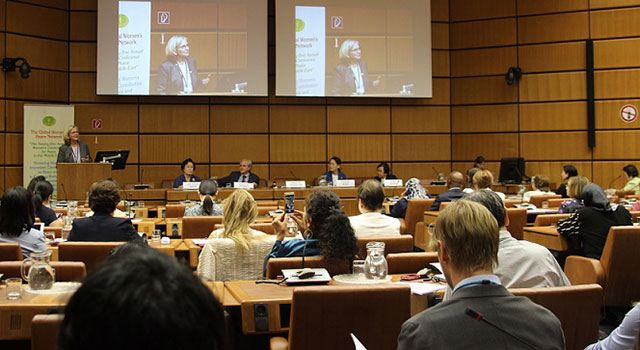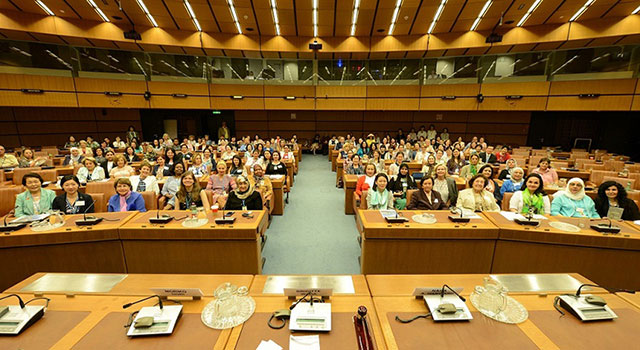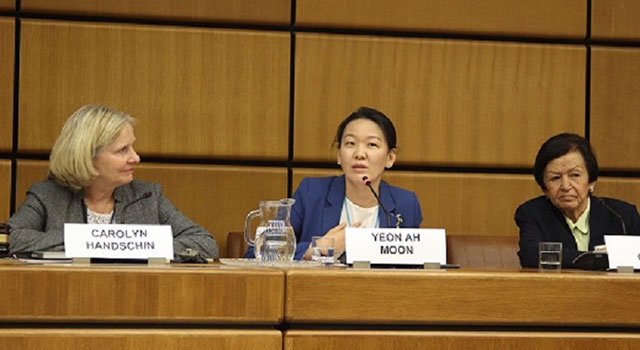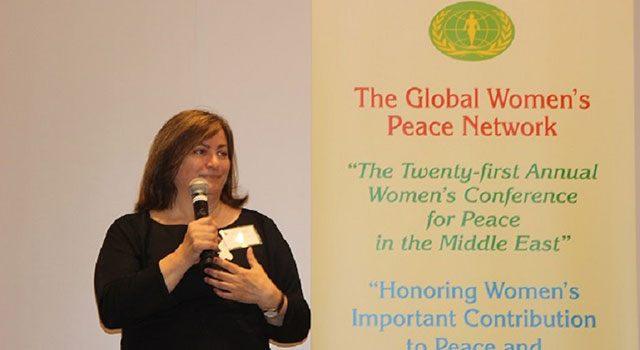MEW21 in Vienna
21st Women's Conference for Peace in the Middle East
CAROLYN HANDSCHIN AND JE-OK PRESSER
JULY 6-7, 2017
Honoring Women's Important Contribution to Peace and in Creating Sustainable Environments during these Uncertain Times in the Middle East
On July 6-7, 2017, the Global Women's Peace Network, sponsored by WFWPI, welcomed representatives from nine governments and UN agencies such as, UN Women and United Nations Office on Drugs and Crime (UNODC) to Vienna, Austria for the 21st Annual Women's Conference for Peace in the Middle East. Women leaders from 18 countries in the Middle East and North Africa (MENA) region and other experts from Europe and Asia met at the UN Vienna to assess and honor women for their contribution to peace and creating sustainable environments in the Middle East, as well as to facilitate their forward looking strategies.
Opening Session chaired by Ms. Carolyn Handschin
Ms. Carolyn Handschin, Director of WFWPI UN Offices, opened the conference by reminding the audience of the celebratory theme of this event. WFWP is marking its 25th year, 20 years of working with the UN, and 21 years of the Middle East Peace Conference series. She expressed appreciation to the Japanese WFWP who initiated and continue to finances this project. She also lauded the United Nations for the framework by which the successful local activities of women can be brought to a global platform and from that, women in return can be empowered by the knowledge that they are contributing to a larger peace and development agenda.
Prof. Yeon Ah Moon, President of WFWPI, gave a key message explaining that a peaceful world can be created when individuals first realize peace and true love within themselves and in the family, practicing to live for the sake of others. The role of women and mother's in creating peace through their participation in all aspects of life is crucial. Honoring women's peace work in the Middle East, she encouraged them to be examples in creating peace culture and improving quality of life each day in the Middle East.
Mr. Jean-Luc Lemahieu, Director, Division for Policy Analysis and Public Affairs at UNODC, described growing inequalities and discrimination against women and girls. Five million girls will never have the opportunity to learn to read or write and one in three women in the world experience violence by their partners. Nevertheless, he named opportunities in development if women are included, such as in the labor force. The Sustainable Development Goals (SDG's) and the Plan of Action 2030 are a roadmap, presenting women as part of the solution. He quoted the new Secretary General of the UN, António Guterres: "Empowering women and girls is the only way to protect their rights and make sure they can realize their full potential. We can't achieve any of our goals without the participation of women and girls." He added that actions need to follow.
Dr. Amal Osman, Former Minister for Social Affairs and Social Insurance in Egypt, identified a culture of peace as a set of attitudes and a way of life. She highlighted the importance of the family. She expressed that the process of peace is dynamic, requiring participation of everyone, that each fulfills their roles and civic participation, "leaving no one behind."
Dr. Lan Young Moon, President Emeritus of WFWPI, Co-chair of the National Council for Reunification and Cooperation of South and North Korea (2003-2016), stated that increasing selfishness and religious discrepancies can only be solved through love. Based on her experiences in the last 20 years, she is convinced that women and mothers can change the world and resolve conflicts by taking leadership and being engaged. She expressed how the co-founders Dr. Sun Myung Moon and Dr. Hak Ja Han Moon have
been an inspiration to see women as a central point in peacebuilding.
Session 1: "Quality Education and Sustaining Peace in the Middle East (SDG4)" chaired by Ms. Carolyn
Handschin
Dr. Sakena Yacoobi , Founder and Executive Director of the Afghan Institute of Learning, awarded the
Sunhak Peace Prize, expressed her motivation to work with women and mothers, to educate them, to
give them confidence and to empower them to get out of poverty. She has impacted 11 million students
in over 300.000 centers in Afghanistan. She started with offering secret homeschooling during the time
of the Taliban regime and later created women centers where women network, learn to negotiate, to
think critically, reconciliate and practice peace in their families and communities. A new beginning
requires an internal change. She analyzed that safety, security, peace, education and sustainability is a
package which needs to be addressed simultaneously and that she welcomes the fact that the UN is
currently focusing on capacity building in communities.
Ms. Hanan Al Hroub, Palestinian teacher, awarded the Global Teacher Prize, focuses on peace
education, meaning to create peace in each individual by changing attitudes, learning to communicate,
to forgive, to appreciate cultural diversity, to respect each other's differences and to be accountable to
each other. The root cause of conflict needs to be addressed. Since peace starts in the home, families
need to be empowered and women included in peacebuilding processes. She described that peace can
have different meanings, but that for her Peace without justice is not peace and that peace means
ending the occupation.
Session 2 "Women as Educators and Nurturers in the Family (SDG5)" chaired by Dr. Amal Osman
Dr. Farkhonda Hassan conveyed the statement of Dr. Maya Morsi, President of the National Council
for Women in Egypt. She said that Egypt recognizes the importance of the family and the role of women
as educators in the society due to the mother's instinct for justice and bringing peaceful human
relationships. The president of Egypt requests women to be at the forefront, participating on all levels,
which is encouraged by the "Secret of Your Power" campaign. She quoted the Former Secretary General
of the UN Kofi Annan, who said that women can have a huge transformative force by being role models
and setting values.
Dr. Lilly Sucharipa, President of the UN Women National Committee Austria, described around 80.000
Syrian refugees living in the Zaatari refugee camp in Jordan, 80 percent being women. UN Women
created safe spaces for women, where they can exchange their experiences and receive social and
economic empowerment through educational programs, cash for work programs and opportunities to
be involved in camp management. Women received more respect, gained hope, dignity and skills, and
men learned about the value of women. Domestic violence was reduced to 20 percent.
Ms. Fatimah Al Akroka, Cultural Attache at the Kuwaiti Consulate, spoke about her pioneering initiative
to create peace in Kuwait and reverse the trend of early school dropout. Women from different parts of
Kuwait gathered for three day seminars three times a year to create internal peace and good
communication among each other, understanding how important women are to peace and
development. She explained that economic empowerment is crucial for women to feel empowered and
to change their attitudes.
Ms. Alice Keirouz Sleiman, President of the Forum of NGOs of Child Rights in Lebanon, stressed the
importance of peacebuilding values such as open mindedness- and having open hearts. Mothers should
be promoters of peace within their own families and in their social and political life. They play an
essential role in providing security and creating loving relationships within the family and in educating
their children about values such as trust, justice, love, and taking responsibility, which has a positive
impact on communities. She expressed that there is a healthy cooperation between the Lebanese
government, UN organizations and civil society.
Ms. Sevilay Yildirimer, Activist with the women's NGO KAYAD in Cyprus, addressed safety and security
issues of women and presented activities such as trainings for women to become educators aiming to
empower women, strengthen families, provide skills and therefore develop communities. Spaces to
network were created for women and multicultural camps for children, focusing on conflict resolution
and gender equality.
Session 3 "Women's Remarkable Participation in Peace and Development Issues in the Region (SDG1,3)"
chaired by Ms. Natascha Schellen , MBA student in Corporate Social Responsibility & NGO Management
Ms. Mouna Echemmakh, Director of a shelter for women and child victims of violence, Federation of
the Rights of Women in Morocco, presented their activities such as offering legal support, women's
shelter, twelve listening centers, educational programs for youth and capacity building for women
advisors in communities. In 2011 the new constitution brought equality between men and women at all
levels (Preamble Article 19). However, there is a lack of the implementation of these laws. Women are
still suffering polygamy, illiteracy and violence.
Ms. Amal Al-Jubouri, CEO and Founder of Arab Human Rights Academy in London and Baghdad,
depicted how she grew up with war in Iraq, over 5000 women and girls leaving Mosul, traumatized by
mass killings and displacement. She is now improving the psychological well-being of children in Iraq
through art and sport, which they desired. She mentioned that terrorism in Iraq is cultivated through the
education of children when the Sunni and Shia schools may project discriminatory narratives. She
concluded with the statement that a few women can change a lot, but many women can change
everything.
Ms. Sophia Giorgalla, Founder and President of Women without Frontiers Cyprus Branch, expressed
how women need role models to be empowered, describing how she became the first female banker in
Cyprus and pioneered the way for more women in managerial roles in her bank.
Ms. Jessica Montell, Executive Director of Save Israel, Stop the Occupation (SISO), started a
groundbreaking conversation between Jewish Israeli women and Palestinian women in the conference
room by critically analyzing the Israeli educational system, where Jewish children are taught from early
age that they are the real victims of the Israeli- Palestinian conflict. Most Israelis have never met
Palestinians. She explained that hers and other organizations, trying to bring together Palestinians and
Israelis, often are restrained. Nevertheless, there are networks of fast growing civil society organizations
which support reconciliation campaigns. This honest and courageous analysis by her of her government
opened the way for a depth of discussion between Palestinian and Israeli participants which seemed
impossible to imagine in political spheres. Based on this breakthrough, conference participants who
were overwhelmingly from Arab countries expressed a glimmer of hope that viable peace may be in
sight for this seemingly unresolvable conflict. This demonstrated that although women are often left out
in peace negotiations, the quality of their contribution might bring the critical difference.
Session 4 "The UN and Civil Society: Influencing Change and becoming Owners of Peace (SDG17)". Dr.
Zoe Bennett, President WFWP Middle East chaired the discussion following the presentation by
Ms. Carolyn Handschin. She gave several examples of grassroots' initiatives, such as the eradication of
Female Genital Mutilation, which found voice through WFWP at the UN. She described the role of civil
society to inform the UN and governments and work together. She explained that any sustainable peace
culture must be a culture of a "global family" that can change the world by "moving the hearts of
people". Beginning with an internal change, women and mothers need to guide and nurture their
families toward empathy and to learn to focus their talents and life goals for the greatest good. The
Sustainable Development Goals currently provide a viable plan to start to mobilize to think and act like a
human family, but motivation is lacking.
She referred to the speech of the Founder of WFWPI Dr. Hak Ja Han Moon in 1993. "A lasting solution
has to include the understanding of the root of the problem as well as the Source of our existence."
Tapping into a benevolent and common Source would be a natural incentive towards the fulfillment of
Human Rights responsibilities and fulfilling the mandate of the UN for peace.
Session 5 "Women Fostering Peace and multiplying Environments of Healing and Compassion (SDG16)"
chaired by Ms. Kawther Al Jouan, Director of the Women's Institution for Development and Training
HE Ms. Wafa Bani Mustafa, Chairperson of the "Coalition of Women Members of Parliament to
Combat Violence against Women" in Jordan, emphasized that education of women and girls is a right
included in the Universal Human Rights Declaration and the SDGs. The percentage of women's
enrollment in Jordanian universities is 51.2, but their participation in the labor market is less than 14
percent, most working in the informal sector for lower wages and not achieving leadership positions. A
whole generation of Syrian children is at risk of losing their future because of diminishing opportunities
in education.
Ms. Ehteram Malakouti Nejad, Founder and Executive Manager of the Support Network for Single
Women in Iran, started her work as a volunteer from an early age in her home country. The mission of
the Network is to empower single women and to provide support and resources for them to become
self-sufficient.
Ms. Marilyn Angelucci, President of WFWP in Afghanistan, spoke about their activities such as opening
an internet café for educational purposes and a library in Kabul. When forced to leave the country they
founded a school for Afghani refugees in New Delhi, giving scholarships especially to Afghan refugee
girls, who are usually the last to receive education. Furthermore, WFWP Afghanistan provides character
education in English language schools and family counseling in women's centers. They created micro
financing progams to develop their small businesses.
Ms. Lama Al Atassi, French Syrian consultant and teacher in intercultural relations and career
management in Paris, aims to preserve the Syrian cultural heritage in spite of war and as a means to
facilitate peace. She developed the concept of a project where Syrian children, regardless of their origin
would dance together and convey a message of peace, giving children confidence and a purpose in life.
This project was inspired by the Little Angels Children's Folk Ballet of Korea.
Session 6 "Conclusions, Recommendations" chaired by Ms. Brigitte Wada, President WFWP France
Ms. Carolyn Handschin, presented the "Conference Recommendations" for civil society and
governments, as is the annual tradition. In the form of a call for the creation of a "Global Women's
Peace Network" for the Middle East, the outcome document was read based upon the deliberations
during the two days. Accepting them by consensus, the participants formulated concrete action steps to
realize the set goals.
Ms. Nada Abdallah Harward, Consultant for International Affairs at the UN in the UAE, mentioned that
the key factor is to change the mindset of women first, to heal, to forgive, and to convince women to
participate in peacebuilding processes. In this interesting time we are living in right now, where there
are no borders due to technology, we need to trust youth and teach them love, critical thinking and
open mindedness.
Ms. Moriko Hori, President WFWP Japan, specialized in reconciliation studies between Japan and
Korea. She informed the audience that the occupation of Korea by Japan is not taught in Japanese
schools. She herself did not realize the tense relationship until her visit to Korea much later. She
emphasized the importance of the 21 years conference series in bringing women together to listen and
learn from each other for the sake of peace and reconciliation. Recently the Japanese government
invited her to report about WFWP Japan programs in the Middle East. Recognizing the far reaching
impact, they thanked her, acknowledging how much women can do.
Dr. Zoe Bennett, President WFWP Middle East, stressed that every individual needs to take ownership
and responsibility to create peace, since it needs to be created out of a genuine love for people. She
hoped for a valuable impact on their personal lives and work, encouraging all to remain committed to
the action steps we agreed upon.
Closing remarks were given by Dr. Amal Osman who summarized that it has been mainly focused on the
role of women to prevent violence and to create peace in the family, community, society and nations
through being involved in peacebuilding and reconciliation processes. She expressed her gratitude to all
speakers for their statements, participants for their interventions and especially their commitment to
continue in their engagement for peace.
Representing all organizers, Ms. Brigitte Wada thanked and appreciated all, while expressing words of
encouragement to reach the goals. She suggested cooperation and joint efforts to realize the SDG's and
especially women participation in peacebuilding processes in the Middle East region.




